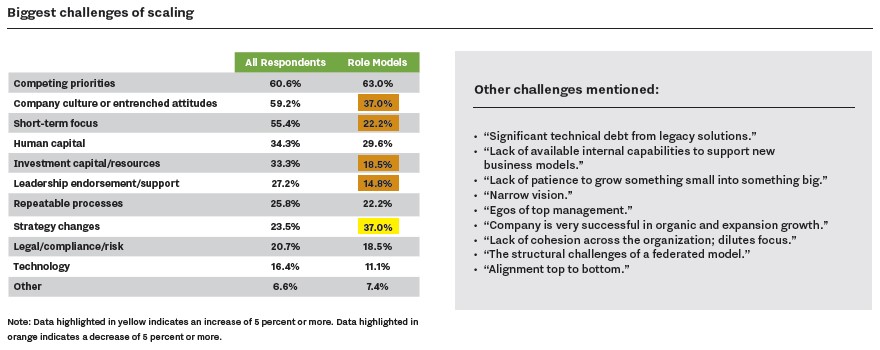Highlights (cont.)
From Prototype to World Domination
KPMG also inquired about the challenges companies face when they try to scale their ideas. As Mr. Spoon from ESPN noted, you want to show real-world value to get buy-in. That means you need to develop a prototype.
But prototypes are not final products. And there comes a time when you need to scale. What’s interesting is that for a majority of the companies polled, specifically 59.2% of all companies polled, company culture was a barrier to scaling an innovative effort. Yet in the Role Model companies, it was an issue in only 37%.
What that means is to expect heavy pushback when you are standing up an Innovation Management program. it will take time for folks to understand the new initiative and their role within the new initiative. It will take time for them to realize that Senior Leaders are in fact serious about the initiative. But over time, they will get on board. And they will be supportive of scaling new ideas. KPMG even notes that there is evidence of that in companies that have been working on this longer.
While it is not called out in the report, my guess is that there is a strong correlation between the enablers that Role Model’s call for, specifically the increased calls for Leadership Support (81.5%) and the Right Strategy and Vision (66.7), and the fact that fewer Role Models identify culture as a challenge to scale.

Incentivizing Innovation
I was encouraged by what I took away from KPMG’s questions regarding incentivizing employees to contribute innovative ideas. First of all, almost two-thirds of the companies surveyed realized that they needed to incentivize. Which is great because it does two things: one, it gives employees a reason to contribute and two it further enforces the culture.
I was also encouraged by what was offered as incentives. I mention a book called Culture Trumps Everything by Dr. Gustavo Grodnitzky often as I love his message about rewarding through non-financial means. Dr. Grodnitzky discusses throughout his book how cash or cash-equivalent rewards provide less long-term impact than social rewards.
He’s right. And many of the companies interviewed by KPMG are following that path as well.